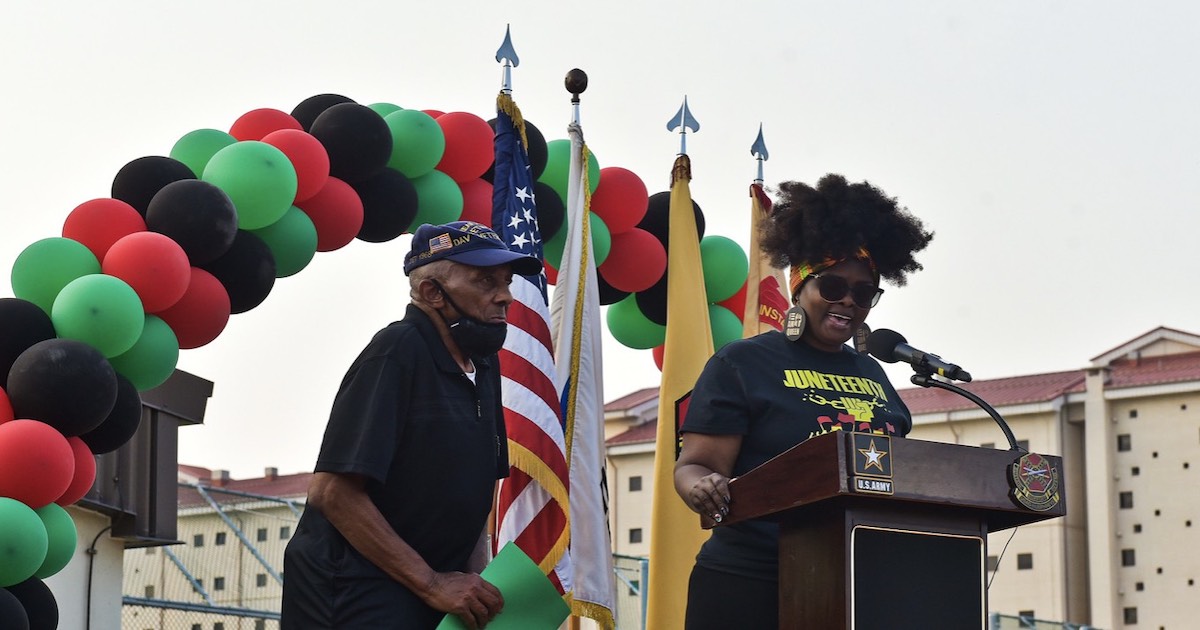
16 Jun 2021 More Project 21 Skepticism for a Juneteenth Day Off
Congress is progressing toward the establishment of a full-fledged, day-off federal holiday for the Juneteenth observance of the end of slavery. Project 21 members, who have supported the Juneteenth message of self-improvement and opportunity for decades, expressed concern about the upgrade and questioned the motives for it.

In a press release, Project 21 member Derryck Green said, “I don’t want the commemoration hijacked by racial activists who would use it as another tool to demonize white Americans under the pretense of racial justice.”

Project 21 member Donna Jackson, in a nationally-syndicated commentary opposing a Juneteenth federal holiday, wrote that “while elevating Juneteenth to such prestige may seem relatively harmless, it comes with the baggage of radicals who are also promoting critical race theory, reparations and self-segregation.”
 Project 21 member Emery McClendon also expressed concern, saying:
Project 21 member Emery McClendon also expressed concern, saying:
Making Juneteenth a federal holiday is not necessary. As Americans, we celebrate our national independence on the Fourth of July. Why split the nation into racial barriers by celebrating Juneteenth as a second national holiday marking independence?
According to critical race theory, America has a systemic race problem because of slavery. By making Juneteenth a holiday, slavery would be sensationalized.
I see this action by Congress as another way to build upon the concept of eliminating white guilt. These lawmakers are only trying to appease certain special interests by going on record with a vote to create the new holiday.
But no amount of appeasement can satisfy the leftist anger or eliminate white guilt. So what’s the point?
 And Project 21 member Martin Baker, who in the press release also questioned whether or not Juneteenth is the best day to celebrate freedom and racial unity, adds that the Emancipation Proclamation does not epitomize the end of America’s participation in the hideous practice of slavery as much as people are led to believe:
And Project 21 member Martin Baker, who in the press release also questioned whether or not Juneteenth is the best day to celebrate freedom and racial unity, adds that the Emancipation Proclamation does not epitomize the end of America’s participation in the hideous practice of slavery as much as people are led to believe:
As a voracious student of American history, I take offense at the “historical significance” that many place on the Emancipation Proclamation. Too many very smart people in our institutions of higher learning teach it as what ended slavery.
That is patently false. Allow me to explain why:
- Proclamation 95 – the official name of the Emancipation Proclamation – did NOT free a single slave in the United States in 1863. When the initial draft was issued on September 22, 1862, it was a threat to Southern states to “cease their rebellion” and stop them from seceding from the Union. If they did not by January 1, 1863, then the Proclamation would go into effect. Proclamations were the early version of the presidential executive order. So consider this, IF those states had actually “returned to the fold,” would Proclamation 95 have been issued?
- Notice the wording of Proclamation 95. It stated that, on its effective date of January 1, 1863, “all persons held as slaves within any state or designated part of a state, the people whereof shall be in rebellion against the United States, shall be then thenceforward, and forever free.” What that essentially means is that it applied only to the slaves in the states of the Confederacy. It did not apply to the Union states of Missouri, Kentucky, Delaware and Maryland that had slaves. Nor did it apply to an exempted Tennessee, 48 counties in Virginia that would become the state of West Virginia, the city of New Orleans and 14 parishes in Louisiana that were under federal control. This left nearly one million persons still treated as property.
Naturally, the “states in rebellion” fancied themselves as an entirely different nation by this time and as such did not feel obliged to adhere to it. They ignored it. President Lincoln issued this as what he hoped was a way to stop the South from using slaves to fight against the Union in the Civil War. Obviously this tactic did not work as many blacks were pressed into service by the Confederacy.
When the news of the Emancipation reached Texas on June 19, 1865 – the impetus for Juneteenth – it had been in effect for over two years. By this point, the key battles of the Civil War had been fought and Robert E. Lee had surrendered his Army of Northern Virginia the previous April to the Union forces commanded by Ulysses S. Grant. The Civil War was over.
Juneteenth also occurred about when the 13th Amendment to the Constitution was being ratified by the selective states. It reached that threshold on December 6, 1865. This is, in my opinion, truly the day which should be celebrated as Freedom Day, not Juneteenth – which could be called a paper tiger. But history is always most kind to those who write it – or those who want to promote it for their own purposes.
In a Newsmax panel discussion that occurred just as President Biden was signing the legislation creating the Juneteenth national holiday, Project 21 Co-Chairman Stacy Washington called the idea of the holiday “a wonderful idea” and “a great thing” while expressing concern for those – including Biden – who would politicize it.
Commenting on how the holiday might be received, particularly by businesses not anticipating a new day off, she told “American Agenda” host Bob Sellers:
I definitely feel like we’ll see a wide range of reactions to this.
Regarding overall acceptance of the holiday, she said:
I actually think it is incumbent upon all of us to celebrate the positive parts and to acknowledge that people have a right to their feelings. And whether or not they support this as a national holiday, the reality is that it is one.. [W]e can all agree to disagree and celebrate if we want to or not celebrate and still keep on pushing.
“Very well put,” Sellers replied.
Stacy also discussed how Project 21 has commemorated Juneteenth for more than 20 years:
We have been celebrating Juneteenth as long as I’ve been a part of [Project 21].
We always issue a press release, and we celebrate the great wonder of a nation that could have been formed in the way that we were – an idea, an experiment. Having to have the concession of slavery included in our founding, and then us going to war – brother against brother, fathers against sons – to make a more perfect union which now includes freedom for everyone.
She also conveyed the themes of past Project 21 comments related to Juneteenth:
I think it’s about telling the truth. It’s about celebrating the emancipation of slavery here in this country. And it’s about making a statement that’s positive and forward-looking.
I do think that Biden… used this time to advance [liberals’] agenda of critical race theory in his comments there. I don’t agree with that. But I think making Juneteenth a national holiday is a wonderful idea, and I think it’s a great thing.



